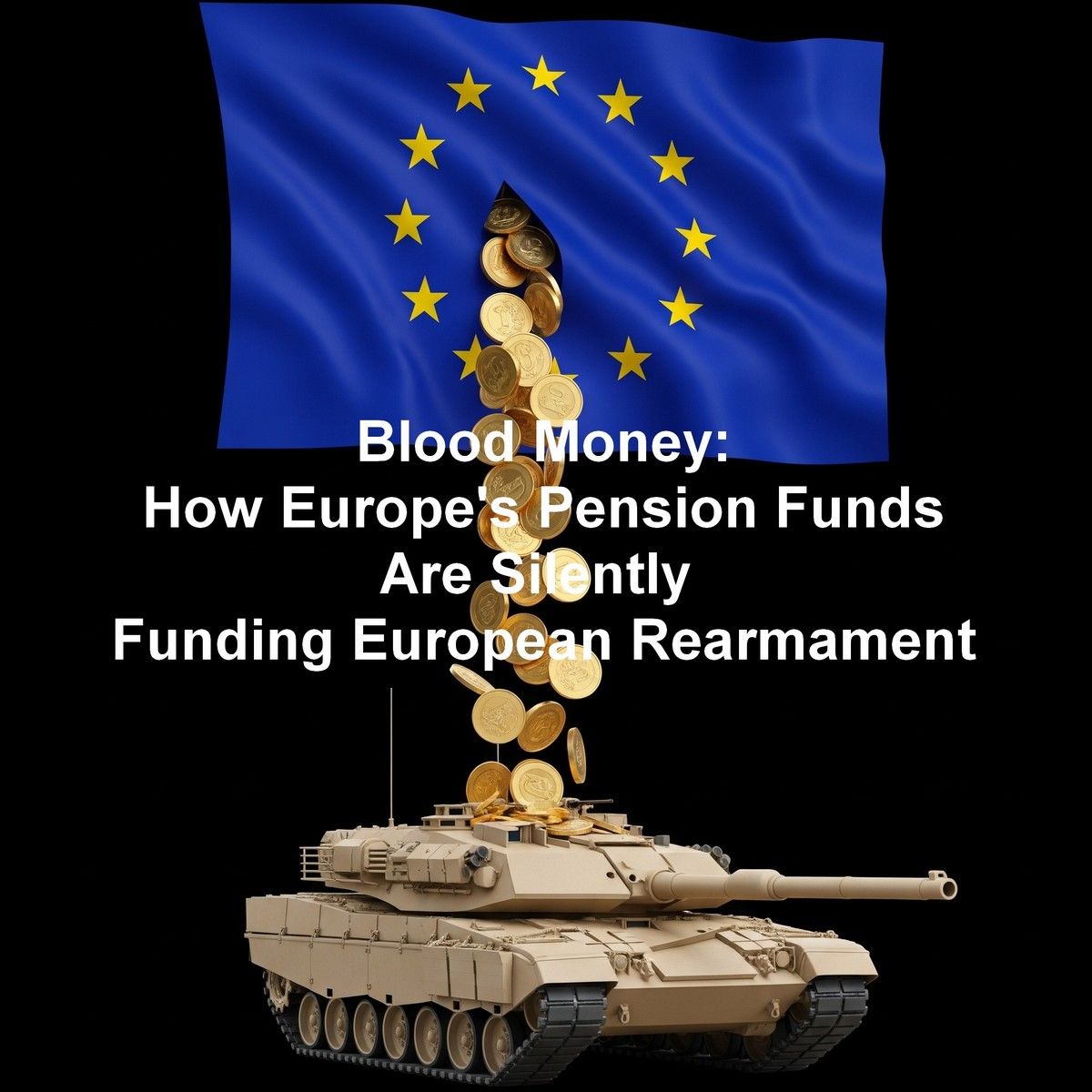Ep3 - Blood Money: How Europe's Pension Funds Are Silently Funding European Rearmament

As announced in the previous episode, in this installment, we continue our analysis on the decline of democracy within the European Union. Last time, we discussed the increasingly evident lack of transparency in the European Union, detailing the infamous Pfizergate case. Today, we'll tackle Europe's double standard, examining a very recent phenomenon: the enormous investments in the armament sector.
The EU's Founding Values vs. Reality
Before we begin, it's important to recall the founding values of the European Union: liberty, democracy, equality, the rule of law, and the promotion of peace and stability. It's crucial to remember this, because the purpose of our analysis is precisely to unmask hypocrisies, demonstrating with facts the profound transformation underway, which is increasingly turning the Union into an empty simulacrum of a democratic federation and, in reality, a club of personal interests for powerful lobbies.
European Rearmament and the Russia-Ukraine Conflict
Okay, before we continue, allow us a small spoiler. The issue of European rearmament deserves more detailed treatment, so we anticipate that we will delve deeper into thematter in an upcoming episode. End of spoiler. Let's start with the analysis of the facts.
Our analysis begins with the Russia-Ukraine war. Since the war reached Europe's doorstep in February 2022, defense companies have significantly increased their presence in Brussels.
On March 4, 2025, the ambitious European rearmament plan, "ReArm Europe," a €800 billion initiative, later rebranded "Readiness 2030," was proposed in a hurry by European Commission President Ursula Von der Leyen.
Initially, the EU merely supplied weapons to Ukraine. The European Union Council's official website provides us with the details: The EU and its Member States have provided €59.6 billion in support to the Ukrainian military. Between 2022 and 2025, the EU and its Member States allocated only €3.7 billion to help civilians affected by the war in Ukraine. So, almost €59.6 billion in weapons, and just €3.7 billion in humanitarian aid.
The site also states that in November 2022, the Council launched the EUMAM Ukraine military assistance mission. Since the mission's inception, 77,000 Ukrainian soldiers have been trained. Weapons and military training: not bad for an organization like the EU, whose founding values, let us remember, are the promotion of peace and stability. Well, yes: to achieve peace, these days it's preferred to invest heavily in weapons and military training, rather than in diplomatic measures. That's how it works nowadays, it seems!
It must also be remembered that the decision to increase military spending in Europe was made urgently. The European Commission chose to apply Article 122, bypassing the European Parliament's vote. Article 122 of the Treaty on the Functioning of the European Union (TFEU) concerns measures the Union can adopt in cases of economic difficulties or threats of severe difficulties for a Member State, due to exceptional circumstances beyond its control. In other words, in defiance of democracy, the European Commission bypassed the European Parliament, acting autonomously.
The Recent Shift: Military Spending Up to 5% of GDP
In a context of increasing demands for military investment, there's talk of a possible increase in defense spending up to 5% of GDP, with the aim of strengthening Europe's military capacity and security. This increase in defense spending to 5% of GDP represents a monumental shift for Europe, translating into billions of euros more invested in security and military technology. The goal is to strengthen the defense capabilities of NATO member countries and respond to current geopolitical challenges.
This will lead to greater investments in sectors such as military technologies and research, with a significant impact on companies like Rheinmetall and Leonardo. Defense sector companies, such as Rheinmetall (Germany) and Leonardo (Italy), are expected to benefit from increased orders and investments in research and development.
The top 10 EU defense companies (Airbus, Leonardo, Thales, Rheinmetall, Naval, Saab, Safran, Knds Deutschland, Dassault, and Fincantieri) are required to declare their lobbying activities in the EU Transparency Register when lobbying in member states. The archives of the LobbyFacts database, created by NGOs, also allow for a comparison with previous records from early 2022 and 2023.
As reported by the Italian online newspaper "Ilfattoquotidiano.it":
"from the lists open on the Berlaymont portal, in just three months of activity, the von der Leyen II team has already received 18 visits from companies and pressure groups in the Defense and aerospace sector. These range from Leonardo to Airbus, from Dassault to Safran, from Thales to OHB."
It further states:
"since the war in Ukraine began, the lobbying budgets of the main European defense companies have increased by as much as 40% from 2022 to 2023. And most of them have used the money to expand their teams based in Brussels."
Why are arms lobbies investing so much money in Brussels?
The answer is simple: war is an unparalleled profit opportunity for the defense industry. The more rifles gripped, the more bullets fired, the more vehicles deployed (and perhaps destroyed), the more money flows into the coffers of armament giants.
Europe's Pension Funds
We've finally reached the heart of this episode: European pension funds. What do European pension funds have to do with arms lobbies? Apparently nothing, given that European pension funds have always been reluctant to invest in the defense sector. However, recently there has been a shift – if one can call it that – in this sector too. Indeed, we could more accurately call it a real U-turn...
That’s just a glimpse! The full story — and the full context — are in the podcast episode below. Curious to hear more?
Listen the full episode on Spotify.
